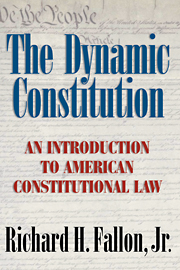Book contents
- Frontmatter
- Contents
- Preface
- Prologue: Bush v. Gore
- Introduction: The Dynamic Constitution
- Part I Individual Rights Under the Constitution
- Part II The Constitutional Separation of Powers
- 7 The Powers of Congress
- 8 Executive Power
- 9 Judicial Power
- Part III Further Issues of Constitutional Structure and Individual Rights
- Appendix: The Constitution of the United States
- Notes
- Index
7 - The Powers of Congress
Published online by Cambridge University Press: 25 July 2009
- Frontmatter
- Contents
- Preface
- Prologue: Bush v. Gore
- Introduction: The Dynamic Constitution
- Part I Individual Rights Under the Constitution
- Part II The Constitutional Separation of Powers
- 7 The Powers of Congress
- 8 Executive Power
- 9 Judicial Power
- Part III Further Issues of Constitutional Structure and Individual Rights
- Appendix: The Constitution of the United States
- Notes
- Index
Summary
The powers delegated by the proposed Constitution to the federal government are few and defined.
– The Federalist No. 45In 1994, in september of her freshman year at Virginia Polytechnic Institute, Christy Brzonkala reported that she had been raped by two members of the school's varsity football team, one of whom allegedly told her, “You'd better not have any diseases.” When Brzonkala pressed a complaint against the two men in the college's disciplinary system, the charges against one were dismissed. The other student was found guilty and initially suspended for two semesters, but the school's provost overturned that punishment as “excessive” in light of the penalties in similar cases.
Rape is of course a crime under the laws of Virginia, and Brzonkala might have sought action by the state's criminal justice system. Generally, however, private citizens cannot force prosecutors to bring criminal charges. For a variety of reasons, prosecutors sometimes hesitate to press rape charges, perhaps especially against college athletes. So Brzonkala filed a civil (rather than criminal) lawsuit of her own in which she sought not to have her alleged assailants sent to jail, but to have them required to pay money damages directly to her. She did so under the Violence Against Women Act, a federal statute enacted by Congress in 1994.
In United States v. Morrison (2000), the Supreme Court of the United States ordered the dismissal of Brzonkala's lawsuit.
- Type
- Chapter
- Information
- The Dynamic ConstitutionAn Introduction to American Constitutional Law, pp. 157 - 172Publisher: Cambridge University PressPrint publication year: 2004



